|
|
|
Sort Order |
|
|
|
Items / Page
|
|
|
|
|
|
|
| Srl | Item |
| 1 |
ID:
090945
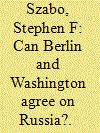

|
|
|
|
|
| Publication |
2009.
|
| Summary/Abstract |
Both Russia and Germany are back on the U.S. agenda. Russia will be a key element of a wide array of policies to the Obama administration, including dealing with Iran and the construction of a broader nonproliferation regime, energy security, nuclear arms reductions, and Afghanistan. Russia policy will also be central to U.S. designs for NATO, including how to deal with Georgia and Ukraine, and the viability of a pan-European security structure.
|
|
|
|
|
|
|
|
|
|
|
|
|
|
|
|
| 2 |
ID:
090959


|
|
|
|
|
| Publication |
2009.
|
| Summary/Abstract |
Why has the Democratic People's Republic of Korea (DPRK) been so defiant against the international community? What could be its external and internal motivations to carry out new missile tests, and even a new nuclear test, in spring 2009 when its economy is in shambles and a large portion of its population is starving? Why has President Barack Obama's "smart power" diplomacy, which stresses dialogue with countries with which the United States has long had difficulties, not worked well with Pyongyang so far? Why does North Korea seem to be ignoring its key ally, China, and its concerns? Beijing is now in an awkward position as North Korea looks uninterested in bestowing any credibility on China's efforts to sustain the Six-Party Talks that are aimed at denuclearizing the Korean peninsula.
|
|
|
|
|
|
|
|
|
|
|
|
|
|
|
|
| 3 |
ID:
090948
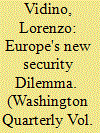

|
|
|
|
|
| Publication |
2009.
|
| Summary/Abstract |
After the September 11, 2001, attacks, governments throughout the world rushed to improve their counterterrorism policies. Several countries tightened legislation, increased resources available to their intelligence and law enforcement agencies, and established repressive policies to uncover and prosecute terrorist networks. Policymakers, fearing an imminent attack, understandably focused their attention on aggressive methods. Yet, over the last few years, many governments have started thinking about more nuanced, comprehensive, and long-term counterterrorism policies, understanding that simply trying to dismantle terrorist networks is like playing a never-ending game of "whack-a-mole," unless steps are also taken to prevent the radicalization of scores of potential new militants.
|
|
|
|
|
|
|
|
|
|
|
|
|
|
|
|
| 4 |
ID:
090946


|
|
|
|
|
| Publication |
2009.
|
| Summary/Abstract |
Economic sanctions have long been the national security tool of choice when neither diplomacy nor military force proves effective or possible. This tool of statecraft has become even more important to coerce and constrain the behavior of non-state networks and recalcitrant, rogue regimes which often appear beyond the reach of classic U.S. power or influence. The challenge is often how to use power to affect the interests of regimes that are likely immune to broad effects of sanctions on their populations.
|
|
|
|
|
|
|
|
|
|
|
|
|
|
|
|
| 5 |
ID:
090957


|
|
|
|
|
| Publication |
2009.
|
| Summary/Abstract |
The Democratic People's Republic of Korea (DPRK) is yet again on the U.S. policy radar screen. Despite President Barack Obama's declared intention to "extend a hand" to adversaries who would unclench their fist, Kim Jong-il decided to challenge rather than reciprocate.1 In a series of orchestrated, disproportionate actions justified as retaliation for the United Nations Security Council's condemnation of an attempted satellite launch in early April 2009, North Korea walked away from every denuclearization measure painfully and incompletely negotiated during the Bush administration's second term in office. On April 13, 2009, only hours after a non-binding Security Council presidential statement was issued, the DPRK described the statement as "an unbearable insult to our people and a criminal act never to be tolerated," asserted that it would never return to the Six-Party Talks, and that it would "boost its nuclear deterrent for self-defense in every way."2 Pyongyang declared that it would convert its entire inventory of plutonium into weapons, resume operations at its Yongbyon nuclear complex, and test intercontinental ballistic missiles. It again expelled inspectors from the International Atomic Energy Agency (IAEA) as well as U.S. personnel facilitating the disablement process at the reactor and associated facilities. The North also announced that it would accelerate pursuit of an enriched uranium capability, a program whose existence it had long denied.
|
|
|
|
|
|
|
|
|
|
|
|
|
|
|
|
| 6 |
ID:
090955
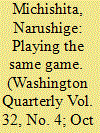

|
|
|
|
|
| Publication |
2009.
|
| Summary/Abstract |
The nuclear and missile capabilities of the Democratic People's Republic of Korea (DPRK) are certainly improving, but that does not mean its strategy has changed. Those who argue that Pyongyang has abandoned diplomacy and chosen a military path risk missing the point: nuclear weapons and missiles are the means, not the ends. North Korea is actually taking necessary steps to prepare for future talks with the United States. In other words, North Korea is playing the same game again.
|
|
|
|
|
|
|
|
|
|
|
|
|
|
|
|
| 7 |
ID:
090950
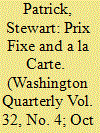

|
|
|
|
|
| Publication |
2009.
|
| Summary/Abstract |
Tremendous forces are eroding the institutional foundations of world politics. Economic power is moving to developing countries (particularly in Asia), transnational security threats from nuclear proliferation to climate change are emerging, and influential malevolent as well as benign non-state actors compete with sovereign states for global influence. Despite these tectonic changes, the superstructure of global cooperation has barely moved. The world thus makes do with creaky institutions that reflect a world that no longer exists-with growing risks to global stability and prosperity.
|
|
|
|
|
|
|
|
|
|
|
|
|
|
|
|
| 8 |
ID:
090944
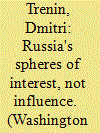

|
|
|
|
|
| Publication |
2009.
|
| Summary/Abstract |
In the aftermath of the 2008 Georgian war, President Dmitri Medvedev, setting out Russia's foreign policy principles, spoke about the country's spheres of "privileged interests" and the government's obligation to defend Russian citizens abroad.1 Coming less than a month after Russia's armed response to Georgia's attack on its breakaway province of South Ossetia, where most residents had been provided with Russian passports, this statement produced a shock. It sounded as if Moscow was reclaiming the Soviet geopolitical legacy of Russia's spheres of influence and was prepared to intervene with force in countries with significant ethnic Russian minorities. The talk of Russian assertiveness, making rounds since the mid-2000s, was substantially enhanced by accusations of Russia's outright aggressive behavior.
|
|
|
|
|
|
|
|
|
|
|
|
|
|
|
|
| 9 |
ID:
090952


|
|
|
|
|
| Publication |
2009.
|
| Summary/Abstract |
President Hugo Chavez of Venezuela has achieved what no other Latin American leader has since the end of the Cold War: bringing security concerns in the Western Hemisphere back to U.S. foreign policy. Might Venezuela provoke a war against neighboring Colombia, spread weapons among insurgents abroad, disrupt oil sales to the United States, provide financial support to Hezbollah, al Qaeda or other fundamentalist movements, offer safe havens for drug dealers, invite Russia to open a military base on its territory, or even acquire nuclear weapons?1 These security concerns did not exist less than a decade ago, but today they occupy the attention of U.S. officials. Attention to these conventional security issues, however, carries the risk of ignoring what thus far has been Venezuela's most effective foreign policy tool in challenging the United States: the use of generous handouts abroad, peppered with a pro-poor, distribution-prone discourse. While the U.S. debate revolves around "hard power" and "soft power,"2 this other form can be called "social power diplomacy."
|
|
|
|
|
|
|
|
|
|
|
|
|
|
|
|
| 10 |
ID:
090954
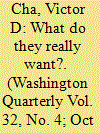

|
|
|
|
|
| Publication |
2009.
|
| Summary/Abstract |
We remained deadlocked over a particular clause in the document. Our counterparts across the table demanded language that we thought to be unacceptable. Yet, in an effort to move the already faltering negotiations forward, we agreed to send the language back to Washington overnight for approval. This was the fourth round of the Six-Party Talks in September 2005. The talks had been suspended previously for well over a year, and the Bush administration, in its second term, was reengaging in a way that the first term had not. At issue was the Democratic People's Republic of Korea's (DPRK) demand that we put into writing a statement of U.S. non-hostile intent. The clause in question stipulated that the United States "has no intention to attack or invade the DPRK with nuclear or conventional weapons."1 To my surprise, the language came back the next morning having been approved in Washington.
|
|
|
|
|
|
|
|
|
|
|
|
|
|
|
|
|
|
|
|
|